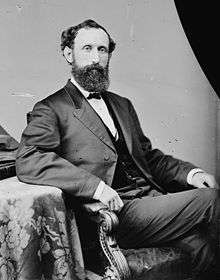Louisiana gubernatorial election, 1872
Louisiana gubernatorial election, 1872

|
|
|
|
|
|
|
| Elections in Louisiana |
|---|
 |
|
|
- State elections by year
- Gubernatorial elections
- Lieutenant gubernatorial elections
- Attorney General elections
|
|
|
|
|
|
|
|
The Louisiana gubernatorial election, 1872, was the second election to take place under the Louisiana Constitution of 1868. As a result of this election William Pitt Kellogg was elected Governor of Louisiana. However, the legitimacy of his election is questionable. The previous Republican Governor, Henry Warmoth, supported the Democratic candidate, John McEnery. Warmoth certified the results from the only election returning boards in the state and he certified McEnery at the winner. In response, McEnery's opponent, Republican Willam Kellogg who was an old friend of Lincoln's set up his own returning boards, even though they had no ballots to count. Kellogg was also allied with the chief federal tax collector in the state, Sam Casey, who was a brother-in-law to President Grant. Casey's post was notorious for its graft. Thus, both Kellogg and Mcenery considered themselves to be the winners. Unsurprisingly, Grant settled on Kellogg with whom his brother-in-law was allied. According to historian John Ezell, "A compromise was finally reached whereby the Democrats were given control of the lower house and Kellogg was free to amass a personal fortune [as governor] in relative peace." [1]
The results of this election were highly contentious and resulted violence across the state, that became racial due to the fact that McEnery's supports were mostly whites and Kellogg had control of the state's black militia. U. S. President Ulysses S. Grant formally recognize Kellogg as Governor supposedly to resolve the violence, although he could have also stopped the violence by recognizing McEnery. He may have also favored Kellogg because of the graft that brother-in-law Casey was able exercise under Kellogg's regime. Kellogg's Democratic opponent John McEnery finally conceded the election in September 1873 after briefly overthrowing Kellogg's government and later obtaining the compromise noted above.
Results
Popular Vote[2]
References
- ↑ John Ezell The South Since 1865 (New York: Macmillan, 1973), 92
- ↑ Jeanne Frois. 2006. Louisiana Almanac, 2006–2007 Edition. Gretna, La: Pelican Pub. Co. p.547


